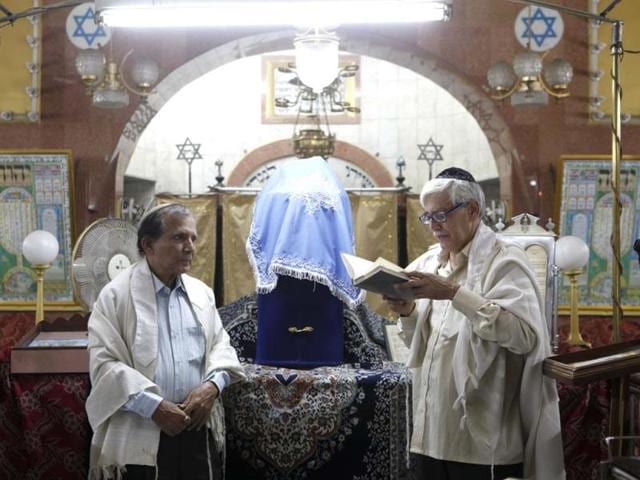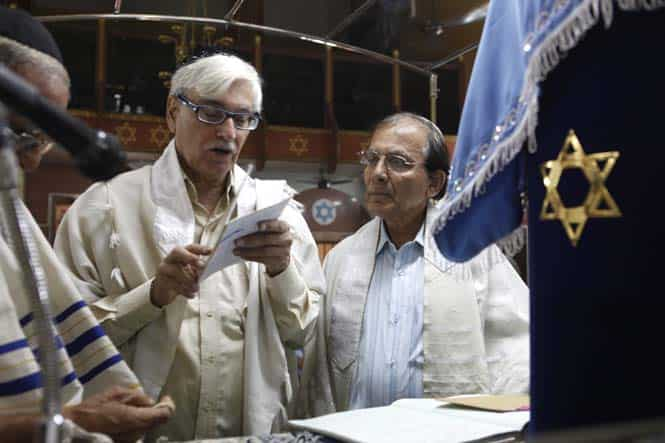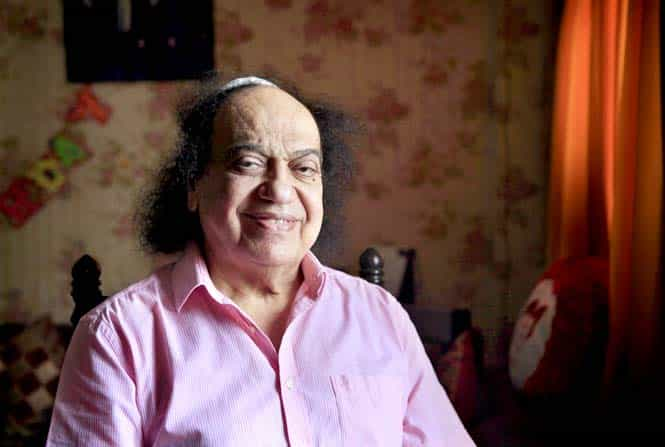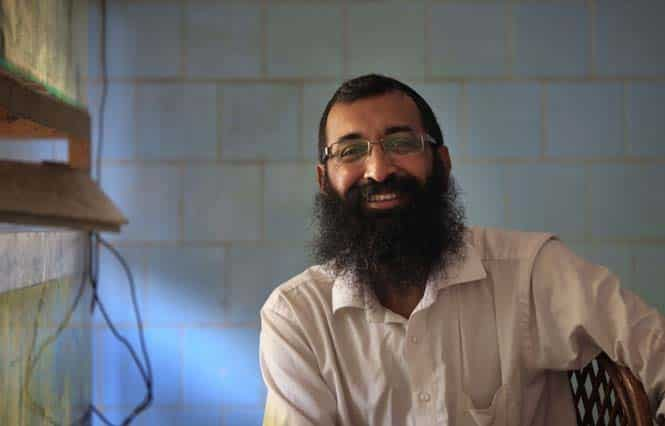Ghost of 26/11 attacks still haunts Thane’s Jews
Security is a lingering concern for Thane’s Jews and over the last few years attendance during prayers has thinned at the synagogue. Around two years ago, to secure the synagogue, identity cards were issued to every member of the congregation.
Shaar Hashamain means the Gate of Heaven; for believers, it is the closest one can be with their god.

But the sandbag bunker outside the Shaar Hashamain synagogue is not exactly a symbol of peace and harmony in this holy place. In fact, it is an indicator that 26/11 was a break-point in the lives of Thane’s Jews -- a reminder of the tragedy that took place at Nariman House in Mumbai, just around 20 kms away.
On November 26, 2008, Pakistan-backed terrorists attacked Nariman House killing six people including Rabbi Gavriel Noach Holtzberg and his wife Rivka, who was five months pregnant. Their two-year-old son Moshe was saved by his Indian nanny Sandra Samuel.
The scars of the terror attack are visible in Thane.
Asking for directions to the synagogue will invariably lead to references of a stone-fronted building guarded by a posse of policemen.
On a Thursday morning at the synagogue, eleven men, one more than the Minyan or the minimum quorum required for prayers, took turns to read the Torah.
Later, they took part in a choreographed ceremony called the ‘Rishon’ where the holy book is taken out from the ark and shown to the four directions. While they prayed, worshippers looked out nervously when a stranger entered the compound.
After the prayers, as the congregation trickled out, Jonathan Borgaonkar, a 63-year old retiree, said that he remembered a time when the number of worshippers was much larger. “The hall used to be full and some people had to stand in the compound of the building.”
Steady migration to Israel and security concerns has reduced the congregation, said Borgaonkar. The new security arrangements, he said, reminded him of Israel which he visited in 2004 to meet members of his extended family (eight of his nine siblings now live there).

Jewish people performing rituals in a Synagogue
“In Israel, you have to walk through a metal detector when you get into a bus, a hotel or restaurant. Now, I see this in India,” he said.
Thane’s synagogue was inaugurated in 1879 and was enlarged in 2007. Of India’s remaining 5000 Jews, around 1800, nearly all of them members of the Bene Israel or ‘Children of Israel’ community, live in Thane. Families from Thane continue to leave for Israel though skepticism about the current economic situation in Israel has dulled the enthusiasm to migrate among the younger members of the community.
Rafael Varulkar, a retired bank worker, said that his son and daughter have resisted the trend to migrate to Israel. “They have good jobs; one of them holds a senior post in a bank. People who have good jobs here do not want to migrate,” said Varulkar. “We are very safe in India. India is our motherland while Israel is our holy land.”
But security is a lingering concern for Thane’s Jews and over the last few years attendance during prayers has thinned at the synagogue. Around two years ago, to secure the synagogue, identity cards were issued to every member of the congregation.
“People feel anything can happen anywhere; it is difficult to analyse terrorist behavior,” said Ezra Moses, managing trustee of the Thane synagogue. “Attendance is a bit less during weekday prayers. But people do come in large number on Saturday (the Jewish Sabbath) and festivals.”
Jews living in other parts of the city, too, worry about their safety. Every time Solomon Sopher, chairman and managing trustee of Sir Jacob Sassoon Charity and Allied Trusts, leaves his house in Warden Road in South Mumbai, he makes sure that he says a small prayer.

Solomon Sopher
Sopher’s habit, something he started after the 26/11 terror strike, is a reflection of the fact that the attack thwarted the free, uninhibited life of Jews in India, a country that had the prestige of being one of the few countries without any history of anti-Semitism.
“Before 26/11, we had no fears or complexes of being a minority in the country. India has been a cosmopolitan country and we never felt that there was anything amiss. Our synagogues were also unguarded,” said Sopher who is a Baghdadi Jew, a group that played an important role in Mumbai’s rise as a trading centre.
The ramifications of the terror attack were felt across the community. “Chabad House had people who were religious. The Rabbi, who used to often visit our synagogue, was the embodiment of religion. He had nothing to do with politics. The incident was devastating for our community and for everyone in general,” said Sopher.
“Our synagogues are now guarded by the police. When we go to synagogues, it is not like how it used to be before. Last month, during our high holidays there was a big alert and we were told to be on our guards. On the most important day on the Day of Atonement we were prepared for the worst.”
Some Jews are avoiding wearing external symbols of their faith to remain inconspicuous. Jewish educator Sharon Galsurkar, who has lived freely in the largely Muslim Byculla locality for ten years, now prefers not to wear his kippa (the skull cap) when he steps outside. "Many times, when I wear my kippa, I have been asked questions about Israel. They ask me, ‘Why is Israel torturing the Palestinians?’, and their questions sound more like accusations," said Galsurkar.
Sharon Galsurkar
Caution has become a way of life for Jews like Galsurkar. “The attack changed our way of life. Though there is no fear, there is a lot of awareness about security. Before the incident, security was never an issue. We thought no one would ever bother us here,” said Galsurkar.
After the 26/11 attacks, his wife and three children went to live with relatives. Last month, when the community was in the middle of their high holy days, it received a high alert, following threats by a terrorist organisation.
“It is so unfortunate that when we went to synagogues during our holy days, the police asked us to keep the festival short. On the day of Simchat Torah (which means the Joy of the Holy Book), we take our scriptures and celebrate till late in the night. However, this time, we were asked to wrap up by 11 30 pm,” said Galsurkar.
“While the police have been giving excellent protection to the community, their presence was never there before, and seeing police officials with guns around the synagogue is not a good feeling. It reminds us that something is wrong,” he added.
Sopher said that though the future of the community in the country looks uncertain, it hasn’t resulted in Jews packing and leaving. “I don’t think anyone left the country because they were scared after the incident,” he said. “The only thing is that we will have to be on our guard all the time. Unless the Centre takes strong steps against terrorism, we will live in fear,” he said.
“I will never leave India because of the fear of being attacked. If at all I go, it would be to keep with prophecies in our scriptures, which mention that Jews must go to Israel,” said Galsurkar.






